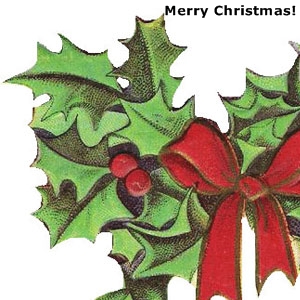by David Roberts
About three years ago, I was in a post office buying stamps for the Christmas season. I observed the postal worker wish each customer “Happy Holidays” when he was done with the transaction. When it came my turn, I asked for my Christmas stamps, and when he said his usual greeting, I mentioned that maybe he could wish a “Merry Christmas” to people who specifically asked for Christmas stamps. He looked at me like I had two heads.
Most people who care about traditions, especially concerning the Christmas season, have noticed the intrusion of Political Correctness into our language. Here are some hints that may help you express your feelings about this in more-or-less unobtrusive ways. Let me say right at the start of this consideration that store owners or corporate heads are much more at fault for this descent into blandness than the clerks who serve us behind the counters. To a large extent, they have no choice in the matter if they want to keep their jobs.
Centuries ago people began wishing each other “Merry Christ’s Mass,” and “Christ” was pronounced like the part of Jesus’ name in the Bible. Somewhere along the way, the two words came together and the long “i” in Christ was made into the short “i” in Christmas. Herein lies one alternative to the epidemic in the business world that commands workers to greet people with “Season’s Greetings,” or more recently, “Happy Holidays.” When someone wishes us either of these insipid substitutes, why not respond with “Merry Christ’s Mass?” If you do, make sure to say Christ’s name correctly.
One of my classmates in high school had the last name of “Holliday.” He was a fun-loving, fast-thinking popular student. One example of his uniqueness was whenever our English teacher wrote a “holiday” greeting on the board, he would correct her spelling by saying there were two “l’s” in that word. Over the years I have thought of him many times, and have come to the conclusion that he was right. If we pronounce the first vowel in “holiday” as a short vowel, then the single “l” would be incorrect. Consider the difference between “holy” and “holly” – or “hoping” and “hopping.” In these cases, when we want to make sure people know how to pronounce the word, the single or double consonant removes all doubt. So one other choice to us is to say, “Happy Holy Day.” If we make it single like that, the message that we mean Christmas Day is clear. If you want to be inclusive of other people’s beliefs, say, “Happy Holy Days.”
One last thought is, why not beat this political correctness to the punch and wish the store clerks a sincerely kind “Merry Christmas” before they can get their meaningless comments out? It’s all in the timing, since you know what they are likely to greet you with. You might be surprised how many people will appreciate this opportunity to perhaps say, “Same to you!”



Pingback: Tweets that mention Christmas Greetings | Daily-Devotionals.com -- Topsy.com
Poll: Safe & Generic Holiday Greetings: Merry Christmas or Happy Holidays? Some people don’t care, but others ha… https://bit.ly/f2JuF0
Merry Christmas = Yes
Happy Christmas = Moderate
Seasons Greetings = OK
Merry XMas/Happy Holidays = Political Correctness